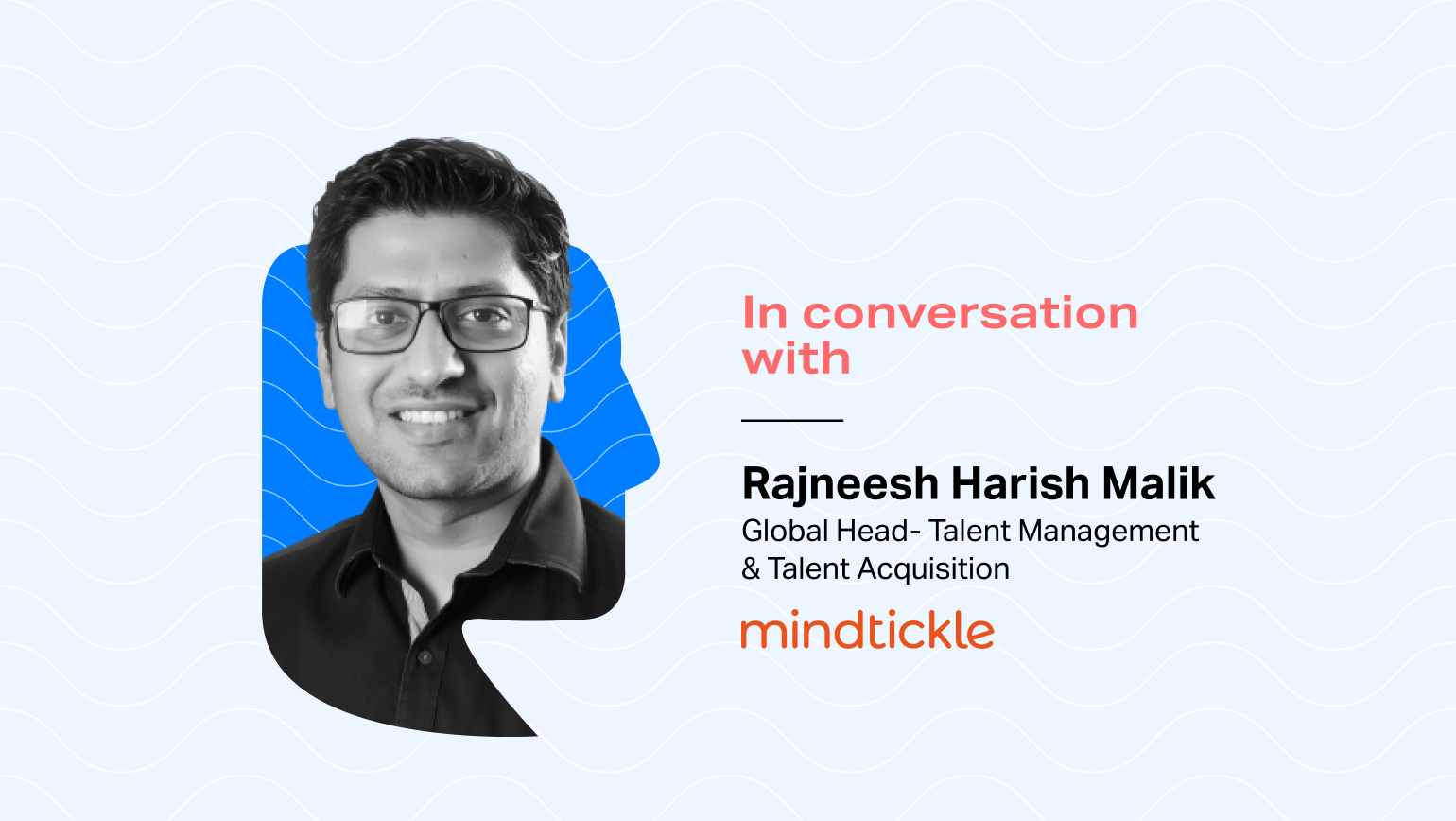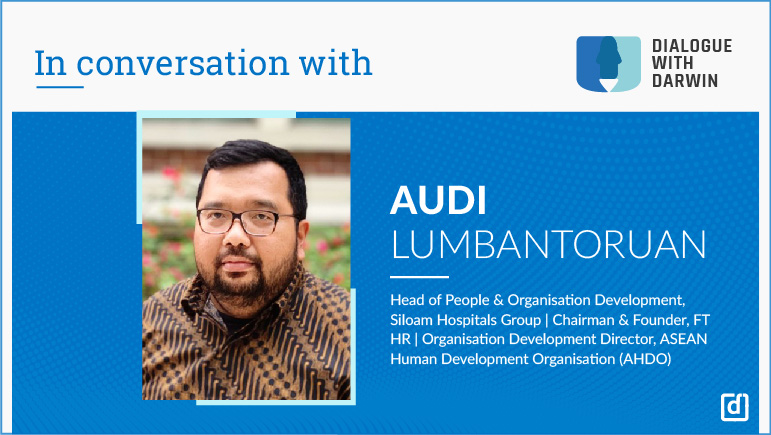 With Chitbhanu Nagri Sr VP of People Operations, Razorpay
With Chitbhanu Nagri Sr VP of People Operations, Razorpay
Growing an Organization’s Culture Organically
Listen to his insights on organizational culture, talent retention, and some learnings from his current role at Razorpay.
Transcript
Hello, and welcome to another episode of dialogue with Darwin today, we're joined by someone who comes with a unique blend of experiences ranging from large multinational organizations to some of India's most respected technology startups like Flipkart, YourStory. And now is the Senior Vice President of people operations at Razorpay.
We have with us Chitbhanu Nagri, an alumnus of Tata Institute of Social Sciences, 19 plus years of experience in the HR field, someone who believes in simple and pragmatic people processes that have deep meaning for employees and a direct impact on business. We are excited to have a dialogue with him on how he sees the future of talent and people success.
Welcome to the dialogue Chitbhanu.
Chitbhanu: Thank you for the kind introduction, Gowthami, pleasure to be here, and many congratulations to the entire team at Darwinbox for hitting the unicorn valuation and the recent fundraising. I think it's not often that an HR tech organization grows at such a spiraling speed and seeing such an organization emerge out of India, think is a matter of great pride.
Gow: Thank you so much Chitbhanu for the wishes. And in fact, even our excitement is about how much more is there to explore in the talent space through technology. And the recent news only comes as a valuation of how big that opportunity is, and not just the work that we are doing.
Gow: To start off with that, we would definitely like to pick your mind on several topics and, under the spectrum, but to begin with, Razorpay is one of the fastest-growing startups in the country today. And you are at the helm of people management in this organization. How do you define, communicate, and live the company values?
Chitbhanu: Unlike popular belief, culture really is, the behaviors, the communication, the dialogues that happen on a day-to-day basis. I think some of the best organizations that have grown a strong culture, have grown it organically when they actually mean what they say and they do what they need.
I think at Razorpay, the foundations were set early on and were amongst the first few things that have Harshil and Shashank established very clearly, one of the things they stressed was what kind of an organization do you do we want to grow into? And which translated into what the cultural tenets for the organization will be.
And this was probably when the organization was as small as maybe the first 10 people or the first 20 people. So, when you articulate and identify your cultural tenets early on, it establishes the right foundation that can only grow stronger if the vision and the power of the founding team is behind it.
The second was to continuously educate and reiterate this message because the best of cultural tenets, of their message, can get diluted unless it is reiterated and reiterated effectively. We use various forums to educate our people on how culture comes to life in the company. For example, during induction, there's a substantial portion of time is spent telling people about what's the culture at Razorpay.
And, and it's not a boring presentation. These are case studies, these are actual examples, these are stories from people's lives, that we pick up and bring out a flavor of how the culture comes to life in practice. Every all hand that we do, which happens every month at Razorpay, there is a clear section which is on, on updates from culture. There's a person who comes every month and we call the section as folklore. They're the person talks about his or her experiences of living reserpine culture. So, this is hearing firsthand from people who come impromptu and speak about their experiences. A lot of these stories when they come out, when people hear, resonate very well.
Finally, I very strongly believe that you reinforce things that you track well. And when you track them in instances where they are. So, for Razorpay, whether it is hiring performance reviews, rewards, and recognition decisions on promoting people or otherwise, how well are they living Razorpay’s culture is a significant aspect of taking that decision. There are many people who were absolutely talented where the right skill fit into their roles, but we did not get confidence that they would be the right culture fit into Razorpay. And then we took the call of respectfully declining their candidates.
Yet there are a lot of promotions and a lot of performance review discussions, where we take a stand and a decision because we see the person displaying or not displaying a certain cultural tenet. So, what I'm trying to say is that these cultural tenets have a meaningful impact on people's journey with the organization. And when that becomes evident, people realize that this is important. I think due credit to Harshal and Shashank, frankly, if they have not put their vision and their might behind this, I don't think Razorpay’s culture would have grown into what it is known to be today.
Gow: Interesting to learn and interesting to know conversations like folklore, sounds very unlike tech companies engagement plan, but I think reinstating, it's not just about defining, but reinstating it at every incident possible, I think is the most critical takeaway for me in this. And reinstating that cultural aspect through stories directly from employees.
that's lovely to learn Chitbhanu. Like I mentioned in the beginning, I definitely want to pick your mind on something that's on top of every fast-growing company today in the country, uh, all of us are witnessing the excessive war for talent, And in these times, what would you recommend is the way to go about, to engage employees in a purposeful manner and most importantly, retain talent when they're being quoted by, you know, at least two to three people every day.
Chitbhanu: I have an extremely unpopular email about this. My approach is to go back to fundamentals. I think a lot of things that we end up doing on a day-to-day basis are a reaction to the fire of the day or the flavor of the season. That is never a great idea when it comes to talent engagement and retention. I'm of the firm belief that does few things but do them consistently and do a really good job of those things. And it will impact it will make a positive impact on employee engagement.
Let me start with the most basic and the most important thing. How much focus is the organization providing, and how much focus is the organization putting on providing meaningful and high-quality work? It's the organization really introspecting and thinking whether the work that we have that we provide, is really aspirational.
Do people really think that they're making an impact? they're creating value for the organization and for its end customer. So, what's the big picture that you are solving for? How well is that being understood and how well is that percolating down to every team member in the company?
We often believe that for an engineer, it's the quality of the code that is important. Not really, it's what use is that good being put to, what impact is it creating? What problem is it solving, is it what creates a much bigger impact? So, a concerted focus on constantly reviewing and improving the quality of work and, and building a framework around it, which, enables constantly improving this is very important. Second is, are you equitably rewarding your people? And the reward is not just about the monetary part of it, while that's very important, but starting from what kind of growth are people seeing, you started by saying Razorpay is today one of the fastest-growing startups in the country, unless that growth, that speed of growth translates to the career experiences of our team members, they will never resonate with the point that Razorpay is growing fast. Razorpay grows only as fast as I, as I see my own career growth. So, what's the growth roadmap that you're providing to people, can an engineer today become a director of engineering and future, can a salesperson who's on the forefront of selling solutions see how I can become a leader in the sales team tomorrow. And I'm not saying you need to have a lofty career framework. I'm not one for those. Are you providing that clarity, are our managers in their discussions, having that conversation, telling people how to go about it, telling them where is the gap, which needs to be bridged for them to get to the next level. So, that's, that's very important.
Second, as I said earlier, financial rewards. So, are you scientifically positioning yourself against whatever is the right benchmark? And are you confident that I've done a great job of ensuring that I'm paying my people exactly the way I think I should be paying, which justifies the quality of talent that I, that I hire, often not enough scientific work is done around it and that creates a lot of short and long-term challenges for the company. Third is the recognition, many a times people believe that they do a lot of good work, but it is not acknowledged. People need to hear often that they're doing well, that they are contributing to the company. So, are we creating mechanisms, means, platforms very genuinely go down and say, thank you to our people. We often do not recognize the power that this platform carries, we either do not do it at all or we do it in a very thick-in-the-box thing. Oh, we're doing an all hands this is another thing that needs to be done. We've got 10 minutes for R&R how do we do? That's not the right way to do it. If we look at it as a strong lever to engage and retain people and then very mindfully do a great job of it, trust me some of these things are a lot more impactful than fun events, and offsites. A lot of other things that we do, which I'm not saying are not to be done, but that you skimmed the surface with some of these we'll go deep and you make a long-term impact.
Gow: Oh, absolutely. It's one. I think I take away that we need to shift from important work to impactful work.
I have a lot of takeaways for our own organization’s hiring and my own functions, hiring from the conversation we are having. But, thank you so much for that. And then I would get to the last part of the conversation, where I wanted to understand what is your take on HR technologies?
And I'd given all the things that we spoke about, HR technology’s role in ensuring hyperscale for companies like Razorpay and ensuring a better experience for employees.
Chitbhanu: I think as organizations grow in their journey; you see a constant shift from a person-dependent process to a process that is driven by systems and right practices. And if those evolve well, that brings scalability into the organization. Let's say till the time you are a hundred people organization, there can still be individuals who can drive a lot of things by their own passion by their own group force. But once you've crossed that the principle of marginal returns comes in and you may apply as much brute force you want to do, you may be as passionate as you, as you think you would. That's not going to give proportionate results. So that's when systems, processes, and technology comes into place. And that sets you up for the next thousand people in 2000 people that you want to hire.
I think, what is important is how clearly has the requirement been articulated? Otherwise, there are a lot of off-the-shelf products that are available. You can easily go and purchase an APS and HRMS and LMS put them all together, see that the APIs are talking to each other, and you have a system out there, but it still isn't effective, people do not adopt it. And that is because we did not start by first asking ourselves what our requirement is then organizations build their own product. For example, a company, which is into financial services, builds a bill, builds a FinTech product. They're eco deep into what does my customer really require. The same applies to our internal products as well, we need to go deep into figuring out what do our people really require across the value chain from hire to retire. So, requirement gathering is important. Second viewing technology as an integrated solution provider and not a piecemeal solution provider.
So, companies even after evolving and growing to a certain level are looking at how do I get my ads? And the recruitment person looks at that. How do I get my LMS, which the learning person looks at? How do I get my core HRMS in place? It may be the HR shared services put some looks at, and nobody puts this all together on a common thread, I think that's not the right way to move forward. Practically speaking, a lot of organizations do that. We have also gone through that to some extent, we still struggle with that, but the intent has to be that as we go forward, how does this weave together into one integrated story, and the faster it happens, the better it will be in terms of the value that the technology solution will deliver.
Finally, how much are we focusing on user experience? How much are we involving our users in the journey of defining that requirement, getting the right product, implementing it, that makes a lot of a difference, particularly in new-age companies where user interface and user experience are so important where people live and die for it. When people don't see that translating into some of the internal tools that are being built, like my laptop breaks down and the tool on which I have to raise a ticket, the UI is so bad that, I say, I will go myself and get my laptop repaired. I don't want to raise a ticket. It is sometimes so inconvenient.
What kind of an impression is that creating? and then finally ongoing support, I think the speed at which you can make incremental changes is the speed at which you can debug whenever you face some challenges. if there is real-time, real good quality support available. And, and if that can help you solve your challenges that come down the road, that really delivers an impactful experience.
And I think all of these things when they come together, they probably deliver you a benchmark level HR technology product, which any organization will have a lot of respect for.
Gow: You are an avid reader, as I understand. And in fact, the sports enthusiast, uh, are there any book recommendations that you would give to your team?
Chitbhanu: I'm very passionate about books that, uh, help you delve deeper into your life question. Some of the things that we typically don't do on a day-to-day basis. So, two, three books that come to mind. One is a book that's called “The Road Less Travelled”. It's written by a psychotherapist called Scott Peck. it goes very deep into telling a person about what's a more meaningful way of leading life. What are some of the things that you should question you should realize you should accept, which make living your life a lot more purposeful.
Second is a book on similar lines called “A Man's Search for Meaning”, it's again, written by a psychoanalyst, Victor Frankl here talks. Victor comes from a Holocaust survivor. But he really talks about when you even then, when you go through very painful experiences, how can you convert that to finding positivity and purpose in life.
A very inspirational book, the last book, which I've read recently is called “Principles”, written by Ray Dalio. Ray runs one of the largest hedge funds in the world and he has written an amazing which is the synthesis of learning learnings of many, many decades. And he calls it principles by which you can lead your professional and personal lives.
I think there's a lot of wisdom in this book, which will make us better professionals and better individuals.
Gow: Oh, lovely, had the brilliant opportunity of going through two of them, myself, and completely agree with you that the good insights into how to look at life
Gow: Any tips on how to be more efficient in a virtual working context.
Chitbhanu: I think everyone is inundated by the number of meetings that we have in a virtual environment. So, the easier we can make those conversations, the better it is at Razorpay we focus a lot on the quality of documentation, particularly breeds that go into meetings. And these don't have to necessarily be long PPPs, even a single word document, but well structured, well-articulated makes meetings a lot easier many times when people do a good job.
We come into the meeting. Some people have already read the document and we straight get into a discussion. Many times, people have left comments because it's a Google doc. So, the conversation starts even prior to the meeting. I have really come to admire the value and impact of that good quality documentation can have, especially when you are working virtually absolutely something to learn.
Gow: Any advice to the HR folks that have helped you in the past.
I mean, one is a fundamental belief that I have, I often repeat it in my conversations or when I coach people in my team. I ask people to focus on becoming good human beings before they aspire to become good professionals. I think in our pursuit to achieve professional experience we often neglect, the basics of life and pity being kind to others, helping others. So, I often tell people that, every time when you are, leading your life, ask yourself am I first a good human being and am I every day making an attempt to become better at that professional excellence can come much later.
The second I think is subject matter expertise. I think over the years, right from the early two thousand, when the IT boom started in India, HR professionals, particularly HR business partners have become very strong generalist problem solvers. But I think, the focus on expertise has come down. So, the same way as to be a legal person is an absolute expert in his or her job, a finance person, a chartered accountant, etc. I want our HR people to be recognized more and more for the subject matter expertise that they bring to the table. So, I would like my business partners, my HR professionals to be trained as expert coaches, facilitators, change management professionals, experts in labor laws, etc.
These are skills that are always relevant, but unfortunately, our focus on those has reduced. And I would like to see a renewed focus on how we build the subject matter expertise. Trust me, in the next 10 to 20 years as companies like Darwinbox disrupt us on the technology front. These foundational capabilities will be the future of the HR profession.
Gow: Oh, absolutely. Very interesting that you point that, and I completely agree with that.
Gow: last thing, I would probably struggle if someone asked me this, but your motto in life,
Chitbhanu: Very similar to what I just said earlier, my father had said something to me in my childhood. It still resonates that you only live once, but if you live it right once is enough. I think that every passing day, our focus has to be as much as I'm getting from the ecosystem. As much as I'm benefiting from the ecosystem. Am I giving it back in the service of the ecosystem, in whatever, whether it is social work, whether it is coaching other professionals, whether it is helping young companies, it can be anything or giving money to someone who is out there on the streets.
I'm not saying one is bigger than the other. But are you continuously making an effort to do that? So do the right thing and it will make life more meaningful.
There were great insights and I hope the audience also gets to take away as much as I got to take away from this conversation, uh, to change the way we would approach talent from tomorrow.
Thank you so much for your insights and it was a pleasure having a dialogue with you. The pleasure was mine.
Nominate Myself
Nominate Someone Else
Your Sunday Watchlist
 With Rajneesh Malik
With Rajneesh Malik
Global Head- Talent Management & Talent Acquisition, MindTickle
In this interview, he talks about various aspects of organizational culture, hiring, his views on the importance of putting people at the heart of the business, and much more.
 With Augustus Azariah
With Augustus Azariah
Employee & Labor Relations Leader at Kyndryl
Listen to his insights on the ‘Future of Work,’ that much-debated topic – hybrid work, talent management and much more.
 With Priya Chakravarty
With Priya Chakravarty
Sr Director HR in Essar Capital
Listen to her insights on managing a distributed and diverse workforce in the hybrid work setup, and some interesting HR initiatives at Essar Capital.
 With TN Hari
With TN Hari
Author, Angel Investor, CHRO, Big Basket
Listen to his insights on building a sustainable company culture in the hybrid world.






